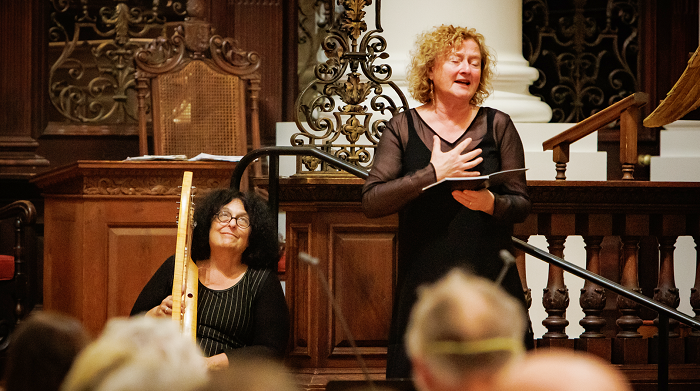Music That’s ‘500 Years in the Making’
Early Music Now's guest performers Anne Azéma and Shira Kammen revivify Medieval, Saxon-flavored words and music.
“There is music inherent in all poetry,” according to renowned early music specialists Anne Azéma and Shira Kammen. But what to do when words survive but melody has been lost?
Azéma, a soprano and artistic director of the Boston Camerata, and Kammen, who describes herself as a “multi-instrumentalist and occasional vocalist,” share answers to that question on Saturday, November 23. Early Music Now will present the pair in a concert called The Man in the Moon: Songs and Tales of Medieval Albion.
Early Music Now executive and artistic director Charles Grosz suggests the concert will epitomize a truism in the field of historically informed performance: “It will be a world premiere, 500 years in the making.” Here’s why.
Many celebrated early music performers are also respected scholars who, though years of study and research, have amassed deep knowledge of performance practice, historic context and instrument development. Their skills allow them to piece together melodic and textual fragments discovered in scores and texts, “hopefully as true to the period as one can discern from the sources we do have,” Azéma and Kammen explain. To bring these treasures to audiences, they use techniques such as contrafacta (matching a new text to a known tune), arranging, borrowing bits of melody, and composing new melodies.
The Man in the Moon draws upon narratives and poems from Albion (the earliest-known name for the island of Britain) written in Middle English, a fusion of Saxon and Romantic linguistic traditions. The program reflects collaboration with fellow musicians to augment and adapt these Medieval writings, found in archival collections housed at the Bodleian Museum in Oxford, King’s College in Cambridge, and the British Library, among others.
Three instruments popular in Medieval England will accompany Azéma’s singing and monologues. She will play the hurdy gurdy, also known as a wheel fiddle. A rosined wheel turned by a hand crank rubs against the strings to produce sound. Keys are depressed to push wedges against the strings to change their pitch. The instrument also can produce a drone to accompany a sung melody.
Kammen, a master of both modern and historic stringed instruments, will play the Medieval harp and the vielle, a bowed string instrument that is a predecessor of the violin. In an interview, she described the poignancy of Medieval music as “a play of consonance and dissonance, always a tension and a resolution.” As for the reconstruction work required to perform these ancient pieces, she called it “cooking without a recipe. It’ll be tastier if you use what you happen to have with skill and wit.”
The Man in the Moon will be performed at 5 p.m. Saturday, Nov. 23, at St. Paul’s Episcopal Church, 914 E. Knapp St. in downtown Milwaukee. Tickets are available online or by calling 414-225-3113.
If you think stories like this are important, become a member of Urban Milwaukee and help support real, independent journalism. Plus you get some cool added benefits.
Preview
-
A Sacred Choir, 70 Voices Strong
 Dec 14th, 2025 by Martha Brown
Dec 14th, 2025 by Martha Brown
-
Prometheus Trio Goes Bohemian
 Dec 3rd, 2025 by Martha Brown
Dec 3rd, 2025 by Martha Brown
-
Present Music Offers New Choral Works
 Nov 20th, 2025 by Michael Barndt
Nov 20th, 2025 by Michael Barndt






















